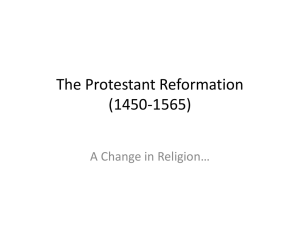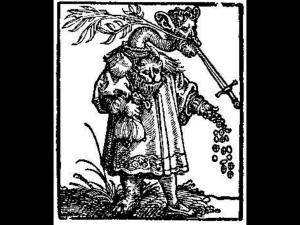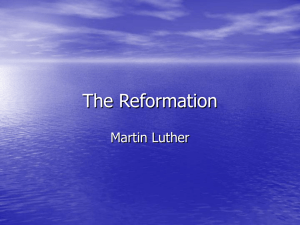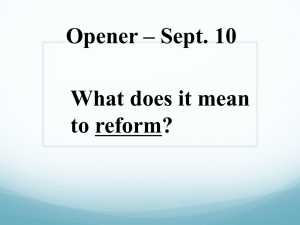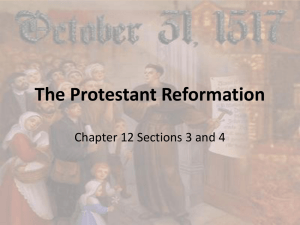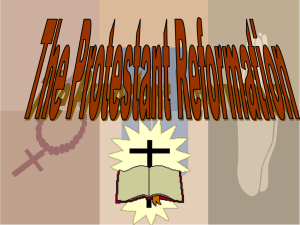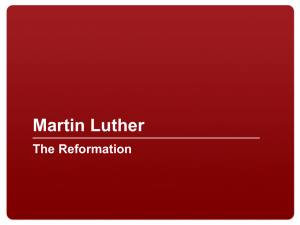Introduction to the Reformation
advertisement
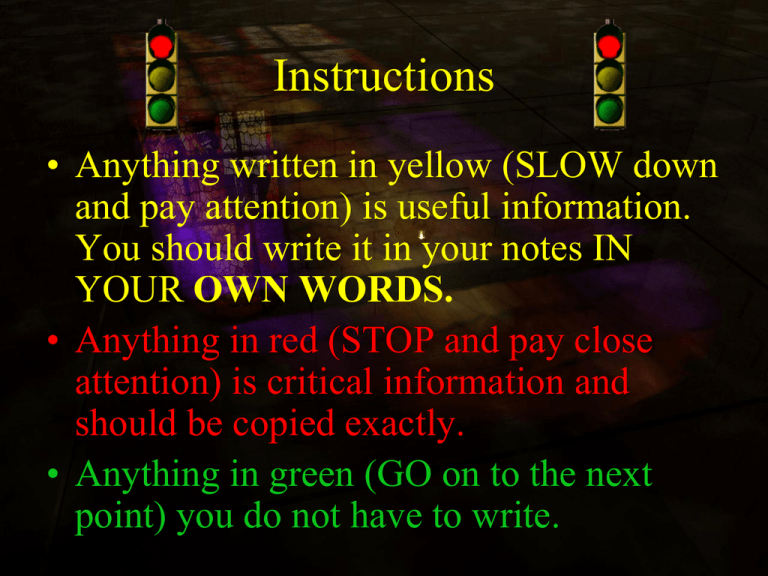
Instructions • Anything written in yellow (SLOW down and pay attention) is useful information. You should write it in your notes IN YOUR OWN WORDS. • Anything in red (STOP and pay close attention) is critical information and should be copied exactly. • Anything in green (GO on to the next point) you do not have to write. The Reformation Remember: • The Church was incredibly powerful and influential. • They taught that they could not be wrong about anything. • If you disagreed you could be excommunicated. However: • Reading led people to realize the church might not know everything. • The behavior of some priests during the Black Death gave people doubt. Wait led a minute… • Humanism to new ideas I’ll tellabout you what, This says I shouldn’t why don’t you the importance of every individual. murder people! just go ahead and bless yourselves? Humanism • During the Renaissance, everybody was religious! • Humanism was not opposed to religion. • Many paintings dealt with religious subjects. • Humanism was a balance between religious faith (from the heart) and reason (from the brain). However… • Humanism emphasized the ability of humans to think and reason for themselves!!! Church Basics ChristianiTree The Christian Church Bible Heaven Jesus Christ Salvation Baptism Catholicism • Authority from Bible and tradition • Salvation earned through good works • Only clergy have say in church matters. • Mass in Latin. •The East andno •There was •Around 1500 West churches Catholic, no the Reformation split who Baptist, no led toover a split in should be the Evangelical, the Church that leader. etc. to this remains day. Reformation •For most of •Around 1000 Christian there wasthere a history, division in the was only one church. branch. The Christian Church •Many people had come to believe the Church needed to be fixed. Problems in the Church Money Problems • The Church became increasingly interested in getting rich. • The pope spent tons of money on his own entertainment. • Donations from people was not enough to make them happy. • They came up with new ways to make money from the people. Priests for Pay • Priests made quite a bit of money and did not have to pay taxes. • The church made money by letting people pay to be priests. • This led to some priests I don’t know not knowing much what this says but I’m sure about the Bible. it’s important! Heaven? No problem! That’ll be 5 dollars. Indulgences • They taught when you died you had to work off your sin in purgatory before going to Heaven. • They then sold indulgences, passes to shorten the time there. • It seemed like they were selling tickets to Heaven. Martin Luther Martin Luther • Luther was a Catholic priest. • He visited Rome early in his career. • He saw other priests acting sinfully and began to question church doctrine. • He did not believe the church could provide salvation. Luther’s Beliefs • “For it is by grace that you have been saved, through faith – and this not from yourselves, it is the gift of God – not by works, so that no one can boast.” Ephesians 2:8-9 • Grace (noun) – Divine (Godly) love and protection bestowed (given) freely on people. • Luther disagreed with indulgences because he said only God could forgive sins, not man. • He directly challenged the church on this and other issues. • He risked excommunication and even death. Luther’s Challenge • Luther nailed 95 arguments (theses) to the door of the local church for all to see. A list of things he thought were wrong with the Catholic Church (95 Complaints) He criticized: The Power of the Pope The Extreme Wealth of the Church Indulgences (Catholic concept of Salvation) Gutenberg’s Printing Press made it possible for Luther to spread his beliefs Gained support from people and criticism from Church •The first thing printed on Gutenberg’s press was the Bible. •This is a picture of a page from one of Gutenberg’s Bibles. Luther’s Basic Ideas •Only faith can lead to salvation, not good deeds •Bible is the ONLY source of religious truth. •Priests do not have special powers to speak to God. •Bible/service should be in vernacular so all can truly experience them. Luther’s “revolution” sparks major conflict in Europe. Luther’s Message • Following publication of theses, Luther continued to study, debate • Contradicted basic Catholic beliefs, insisted God’s grace cannot be won by good works; faith alone needed • 1519, declared only head of Christian Church was Jesus, not pope Empowered the People • Insisted that individual Christians should be own interpreters of scripture, Christian practices should come only from Bible • To aid this process, Luther translated Bible into German • Translation allowed more people to read Bible without aid of clergy Reactions to Luther Church’s Response • 1520, Pope Leo X expelled Luther from the Church • 1521, Luther summoned to appear before Holy Roman emperor Charles V Edict of Worms German Diet • Luther appeared before emperor, German Diet, or assembly, at city of Worms • Refused to change opinions Protestant • 1529, Charles V tried to suppress Lutherans in • Declared Luther to be outlaw, Germany • German princes issued condemned his writings protestatio, protest, against this • Luther’s ideas spread • Emperor handed down Edict of Worms • Term Protestant came from this The Pope’s Response • Luther was excommunicated after he refused to take back his statements. • He had the support of German nobles who protected him. • His ideas spread very rapidly over Europe despite the church’s response. Results Protestant • Luther’s idea spread rapidly throughout Europe. • Millions of people converted to Catholic Protestantism. • Some people went so far as to violently rise up against the Church’s control. • He was a hero to some, a criminal to others.

